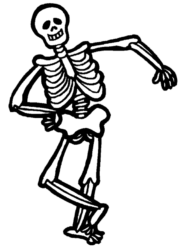Beyond the Body Farm is a very engaging read and by far the most interesting nonfiction book I have ever read. The detailed, intricate stories had me on the edge of my seat. In fact, some of the stories had me hoping they were fiction rather than nonfiction. Whether it was using a sonar to attempt to locate a small plane wreck in a river or figuring the cause of death of a musical icon, the Big Bopper, Dr. Bass had a career that I thought only existed in movies. His life seemed surreal to me, but I was pulled back into reality whenever he recounted episodes of him falling sick on a dig or helping his wife’s battle with cancer. The book also illustrated that not every case can be solved which added a nice touch of realness.
Jefferson Bass did an amazing job describing each case. For each case, the appropriate amount of background was given so that the reader never feels lost, but it is also not too much information where the reader becomes bored. The information was portrayed in a way that made me forget that I was actually learning about forensic techniques and feel like I was reading about the latest CSI episode. I was learning a lot and did not even realize. Photographs from most of the cases were included in the middle of the book which was a nice visual. However, I wish he grouped the photographs within the chapters of the case they pertain to.
I believe that really anyone could pick this book up and not want to put it down. More specifically though, I would recommend this book to anyone who likes crime shows, has an interest in forensic anthropology, or is planning a murder and wants to learn the techniques that can be used to bust them.
Not only did I learn random facts from this book, such as that Paul Revere’s day job was a dentist or that the body temperature decreases about 1.5 degrees Fahrenheit every hour after death, I learned that forensic anthropologists do a lot from only a little bit of the human, more specifically, the teeth. For example, normal DNA would not be able to tell two twins apart, but dental identification can. I did not know how important teeth were in identifying unknown bodies. Forensic anthropology is more recent than I thought. However, if this book only taught me one thing, it would be this: if I am going to commit a murder, lighting the body on fire is not the way to go to hide a body as it is extremely difficult to destroy a body by burning it.
The book left me wanting to know one thing: how exactly did Bill Bass get interested in forensic anthropology? Did he read about a crime in the paper as a child and want to solve it? Did he find bones interesting? Did he discover his love for anthropology in college?

